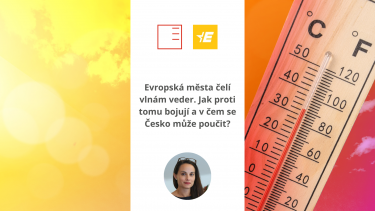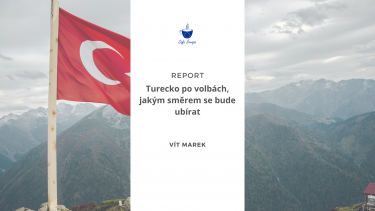Aktuálně.cz: Good, but not very specific. Czechs missed a lot in von der Leyen's speech
The current President of the European Commission, Ursula von der Leyen, will end her term next autumn. It remains to be decided whether she will run again, but her strong State of the Union speech puts her in an favourable position. Žiga Faktor, director of the EUROPEUM Institute's Brussels office, commented on the current situation for Aktuálně.cz.
Show more
EURACTIV: European cities face heatwaves. How are they combating it and what can the Czech Republic learn?
Cities in southern and western Europe are adapting to summer heatwaves. What measures are they taking to protect their citizens? In an article for EURACTIV, EUROPEUM Institute Associate Katarína Svitková describes the situation.
Show more
Deník N: More aid to Ukraine, EU enlargement and Chinese electric cars. European Commission chief unveils her plans for next year
EUROPEUM Institute analyst Vít Havelka commented on Ursula von der Leyen's State of the Union speech, in which the European Commission President covered a number of key topics for the current and future development of the EU.
Show more
EURACTIV | Sánchez's resigned government will probably manage the EU presidency, betting on small ambitions
The Czechs remember very well what it is like to preside over the EU Council without a stable government. The Spanish, however, have kind of counted on this scenario and their presidency is therefore not very ambitious. Nevertheless, they have to fulfill some important tasks. Read what Jana Juzová, Senior Research Fellow at EUROPEUM Institute, has to say.
Show moreDeník N: Turning East, breaking off cooperation. How Slovakia's elections could change the direction of the country
Kristína Chlebáková, our project manager, commented in an article for Deník N on the upcoming parliamentary elections in Slovakia. The elections will take place at the end of September and may change the foreign policy orientation of Slovakia. Some political parties, including the biggest favourite, former Prime Minister Robert Fico's Smer - Social Democracy party, are campaigning on refusing aid to Ukraine, being friendly to Russia and attacking the EU and the US.
Show moreReport | From Vilnius and Beyond: Unraveling the Strategic Potential of NATO's Nordic and Central Eastern European Allies
Our Research Fellow Danielle Piatkiewicz co-edited a report made in partnership with the Global Policy Research Group. In an era marked by shifting geopolitical landscapes, the Nordic and Central/Eastern European countries hold key strategic positions within the North Atlantic Treaty Organization (NATO). Following the recently concluded NATO Summit in Vilnius, it's clear that the Alliance stands at a crossroads. The summit underscored the importance of member nations harmonizing their aspirations, capabilities, and strategic priorities. The report delves into both past and current policy initiatives to offer insights into the legacy of cooperation and strategic positioning of these nations.
Show moreBLOG | Does Türkiye play well-calculated chess moves on the Western board?
Nilsu Eledağ has written a blog about Türkiye's role in determining Sweden's NATO membership and concerns about terrorism and anti-Islamist movements. Türkiye took a slight turn in foreign policy and now plays a closer game with NATO allies. There could be two reasons behind why Türkiye chose to shift towards the West. Find out more in Eledağs blog.
Show moreBLOG | How can the EU boost the implementation of the Franco-German Proposal? A turning point for Kosovo-Serbia normalisation process
Serbia's refusal to recognise Kosovo, which unilaterally declared independence in 2008, is at the root of many problems within the region of Western Balkan. It hinders both countries’ EU membership paths, creates destabilisation in the Balkans, as visible in the recent unrest in northern Kosovo, and hinders regional economic cooperation. Writes our intern from our Brussel's office Costanza Celoria.
Show moreReport | Café Evropa: Turkey after the elections, what direction it will take
On Wednesday, June 7, a debate took place as part of the Café Evropa cycle, on the topic: "Turkey after the elections, which direction will it go?". The invitation to the debate was accepted by Lucia Najšlová, political scientist and author of the book Turkey and the EU: The Politics of Belonging, as well as by Deník N journalist Dominika Píhová and Břetislav Tureček, head of the Center for Middle East Studies at the Metropolitan University in Prague. The debate was moderated by Žiga Faktor, the head of the Brussels office of the EUROPEUM Institute for European Policy.
Show moreAnalysis | To be or not to be: Czech Republic’s ambiguous attitude towards the 3SI | Anticipating the 2023 Three Seas Initiative Bucharest Summit. Advancing
Discover Jana Juzová's article titled "To be or not to be: Czech Republic’s ambiguous attitude towards the 3SI" in the working paper series Anticipating the 2023 Three Seas Initiative Bucharest Summit. Advancing the common agenda. Juzová, a senior researcher, provides valuable insights into the complexities of the Czech Republic's stance on the 3SI. Explore this thought-provoking analysis today to understand the dynamics surrounding this strategic initiative.
Show moreStaroměstské náměstí 4/1
Prague 1 - Staré Město
110 00
tel.: +420 212 246 552
email: europeum@europeum.org
https://www.europeum.org









